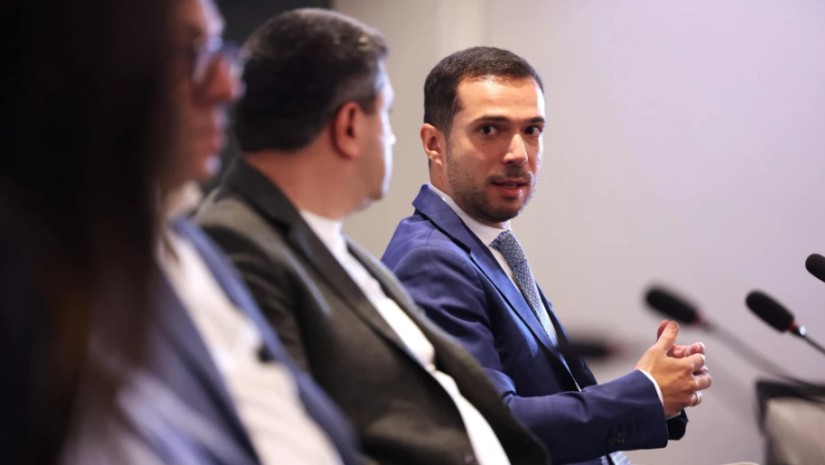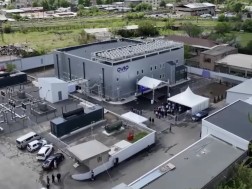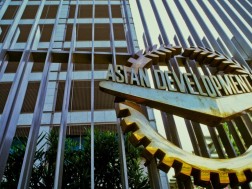In this exclusive interview with BMG, Mr. David Urbaneja-Furelos, Unit Head for Private Sector Infrastructure Finance in the Caucasus Region at the Asian Development Bank (ADB), delves into the bank's long-standing involvement in Armenia and Georgia. With over $2 billion committed since 2005, ADB has played a pivotal role in shaping the infrastructure landscape, from energy and transport to the emerging digital economy. Mr. Urbaneja-Furelos discusses ADB’s focus on sustainable development, the critical importance of data centers for Armenia's digital future, and the bank's innovative efforts in Georgia, including the issuance of the first green and sustainability-linked bonds. As both countries continue to harness their economic potential, ADB’s strategic initiatives aim to foster growth and enhance regional connectivity.
Hi David, thank you for agreeing to this interview. To start, could you tell us about the conference you're currently hosting in Armenia? Why is it important?
Asian Development Bank actually has been active in Armenia since 2005 and we provide financing and support to the public sector, also the private sector. In order to develop the private sector, we actually have been creating opportunities and developing the market. In this case, we believe that the telecom, the ICT and data centers infrastructure, is key in the new digital era. Because of that, ADB is currently supporting a study on data center sector for Armenia, but also how actually that can help the further development of the economy in the country through an ecosystem. So today's conference actually has been about what are the results of that of that study about prospects for the data center in Armenia, but also in line with the directions that are going on in the Caucasus and Central Asia. So we actually brought key stakeholders from government, from agencies, but also from the private sector, leading firms from the telecom sector. In order to together discuss what are the outcomes of this study and how each of us as putting together stakeholders, we can further support the development of the data centers industry in Armenia and beyond.
What are the investment portfolios of the Asian Development Bank in Armenia and Caucasus? Which sectors are they focused on?
In Armenia, we've been active since 2005 and overall, we've committed around $2 billion out of which around 1.5 has been on sovereign financing and on private sector has been around half a billion dollars, which is quite a lot for the size of the economy. We, in the past have financed in the private sector a lot of the energy infrastructure and transport infrastructure in the country. So, this is consistent with now supporting digital and technological infrastructure of the country as we move into the new digital era. In Georgia, we are very happy to actually have grown quite a lot in the last five to six years and become one of the most active IFI (international financial institutions) in private sector. We have actually helped to develop capital markets in the country, especially with ESG (Environmental, Social, and Governance) components. And in fact, we actually have been a pioneer, the first green bonds, the first sustainability linked bonds, supporting affordable housing, also railways. And we believe that the combination of ESG, sustainability and innovation is critical to support the private sector overall the Caucasus region.
How important are Data Processing Centers for the economic development of Armenia and Georgia?
We believe that, as I was saying earlier, like back in the days, and it's important. ADB has been playing a very big role in supporting the infrastructure overall. So the same way that we until now, we still, of course, need roads, we need airports, we need railway with companies growing into the digital sphere, data centers, big data, it's very important to support actually data centers. Without that, we'll not be able to accommodate all the information that is going on in the world, and also companies, whether it's like banks actually government as well, education is all moving to clouds. Therefore, supporting data centers is critical as the country actually grows. However, this needs also a lot of energy and electricity. Therefore, it's very important also for finance, finance institutions like ourselves, but also the market to continue supported energy projects, especially renewable energy, in order to make sure that data centers are actually sustainable.
Which other infrastructure sectors in these countries do you believe are the most attractive for private investments?
As I was saying, when it comes to data centers, it's almost like an ecosystem. For example, in addition to digital you will also need energy. And we and actually we've been active supporting different energy related projects in Armenia, in Georgia and beyond in the region. And we believe that's actually a very positive trend, and we stand ready to continue supporting solar, wind and hydro, for example. In addition to that, human capital and education are critical, because this actually requires new skills and updated skills. So therefore investing in education is something definitely that is can be very advantage for the for the region.
What are the main challenges private investors face when implementing projects in the region?
When it comes to data centers…. private sector in general, sometimes know how is critical, because technology, information is always being updated, and today we play in a global arena, therefore making sure that we actually have access to the latest information. The latest knowledge is definitely critical. Financing is also very, very important. Right access to capital, whether it's through bond market, loan market investors, even equity is very, very critical, especially when it comes to the right financing structures to make sure that these kind of projects, especially in private sector, can actually be developed.
A general question: What are your forecasts for economic development in Armenia and Georgia in the coming years?
ADB actually, through our economic research teams actually publishes online every year the different forecast. We actually have seen a growth in Georgia. We have seen a growth in Armenia over the last years, with GDP per capita increasing, GDP overall, increasing and also expanding to new sectors. So we are very happy to see actually that trajectory, and we stand ready to continue supporting both sovereign operations, but also the private sector to continue being part of the backbone of the economy. So we look forward to more projects, to more activities and to play a role in the development of these economies.
What economic growth do you forecast for this year in Georgia and Armenia? Which sectors will be the drivers of economic growth, and which will be the "downshifters" in Georgia and Armenia?
So, I think overall, we've seen an increase, for example, of tourism in these countries definitely. We've seen a growth in investments in energy, overall infrastructure also has been important and financial sector. But we believe, again, the good things like these sectors can also help to mobilize and catalyze further other sectors of these countries.
Could you please share your insights on the Middle Corridor project? Do you see it as an attractive and promising initiative for the countries in this region? Additionally, could you elaborate on any perspectives or plans the Asian Development Bank might have regarding investments in this project?
Yeah, the middle corridor definitely is a topic that everyone is talking about, and it's a reality. Right at the end of the day, the Caucasus region overall is the gateway of Caucasus and also Central Asia into Europe and other markets. ADB, actually, for many years, has been supporting a program called Carrick that connects different countries of Caucasus Central Asia, and in reality, helps to also support a similar concept of middle corridor. We also very excited to see the developments on the Black Sea cable that people are actually talking about, and there are some studies about that, and we hope that public sector, financial institutions and private sector can actually support that, because ultimately, the Black Sea cable can actually allow economies in the region to access new markets.


















